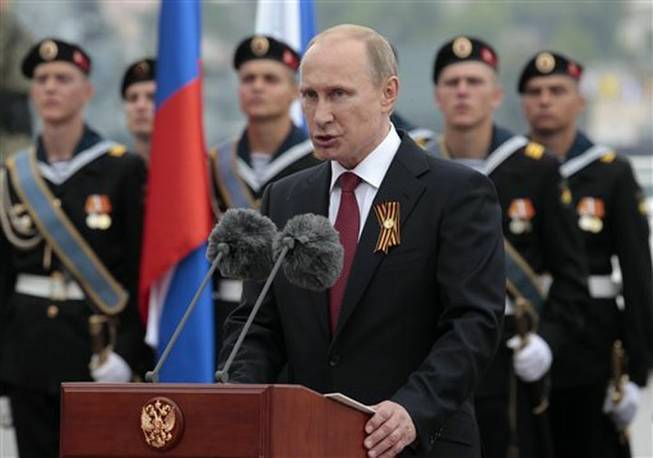
Ivan Sekretarev/AP
Russian President Vladimir Putin speaks at a navy parade marking the Victory Day in Sevastopol, Crimea, Friday, May 9, 2014.Putin extolled the return of Crimea to Russia before tens of thousands Friday during his first trip to Black Sea peninsula since its annexation. The triumphant visit was quickly condemned by Ukraine and NATO.
Tuesday, Oct. 14, 2014 | 2 a.m.
View more of the Sun's opinion section
A few days ago, The Financial Times published an interview with a Russian businessman named Sergei Pugachev. Once an ally of President Vladimir Putin, Pugachev owned shipbuilding and construction interests, as well as a bank. Indeed, he was once known as “the Kremlin’s banker.” But his bank collapsed a few years ago, and, in 2012, the government seized his two shipyards. Jointly valued at $3.5 billion by the accounting firm of BDO, they were sold to a competitor, United Shipbuilding Corp., for $422.5 million, according to the paper.
The chairman of United Shipbuilding at the time was Igor Sechin, one of Putin’s closest associates and the head of Rosneft, the state oil company. Russian businessmen, Pugachev complained to The Financial Times, had become nothing more than “serfs” in Russia. “Today in Russia, there is no private property,” he added. “There are only serfs who belong to Putin.”
And so it goes in Putin’s Russia.
I had been making inquiries, hoping to find out whether the sanctions imposed by the United States and the European Union in the wake of Russia’s takeover of Crimea were working. The answer, I believe, is yes, but not necessarily in the way you’d think.
The first point to make is that the Russian economy has been in a downturn ever since Putin returned to power in May 2012. In recent months, that slide accelerated. Economic growth has flat-lined. The ruble is in free fall. Inflation is rising. More than $100 billion of capital is expected to flee the country this year. Most ominous of all, the price of oil — Russia’s primary asset, upon which the government depends to finance itself — has been dropping.
Although the mounting problems have been coincident with the sanctions, it is impossible to say for sure whether there is a direct correlation. (One thing that is making a difference, I should note, is the boom in American oil and gas, which has produced a glut of fossil fuel and has helped depress prices.) The direct effect will more likely be felt in the near future, when, for instance, Russian companies have to refinance their debt despite being locked out of Western capital markets.
What the sanctions have done, though, is bring out the worst tendencies of Putin and his close associates, putting them on display for all to see. The rule of law has long been a fiction in Russia, but, for years, Western businessmen — and Russian businessmen as well — made excuses. Mikhail Khodorkovsky, the former oligarch who spent 10 years in a Soviet penal colony, had foolishly decided to take Putin on politically, they would say.
But since the sanctions have been put in place, McDonald’s restaurants, which had never had any problems before in Russia, are suddenly being closely inspected and a handful shut down. Other Western companies are having similar troubles.
Or take the case of Vladimir Yevtushenkov, a Russian billionaire who ran Sistema, a big conglomerate. One of Sistema’s assets was Bashneft, Russia’s sixth-largest oil company by output. Last month, Yevtushenkov was placed under house arrest, accused of money laundering. After a court hearing, his shares in Bashneft were seized by the government.
Yevtushenkov was not politically active like Khodorkovsky. He was no threat to Putin. But it is widely believed that Bashneft’s assets will eventually find their way to Sechin and become part of Rosneft. Rosneft had asked the government for a $40 billion bailout to help it withstand Western sanctions; handing it cheap assets is certainly one way to help.
“Rule No. 1 for Putin is that his people will be protected, and he is signaling that,” said Karen Dawisha, a Russia expert at Miami University of Ohio and the author of a new book, “Putin’s Kleptocracy.” “They have started to dip into the pension funds. There are double-digit cuts in the health budget. His people will always be served before the people.”
In imposing the sanctions, the Obama administration and its counterparts in Europe have targeted precisely the men and the companies that are closest to Putin. By reacting the way he has, Putin is scaring away not just foreign investors but Russian businessmen as well. Not that he seems to care.
Just a few days ago, the Russian Parliament began the process of passing a law that would allow the government to seize foreign assets — and use them to reimburse oligarchs and others who have been financially hurt by the sanctions. They are calling it the Rotenberg Villa Law, named for Arkady Rotenberg, an oligarch who had four luxury villas in Italy seized because of the sanctions. This is such a foolishly counterproductive measure that even some inside the government protested it. Nonetheless, it will almost surely pass.
Thus, in the face of sanctions, does Russia cut off its nose to spite its face.
Joe Nocera is a columnist for The New York Times.

Join the Discussion:
Check this out for a full explanation of our conversion to the LiveFyre commenting system and instructions on how to sign up for an account.
Full comments policy